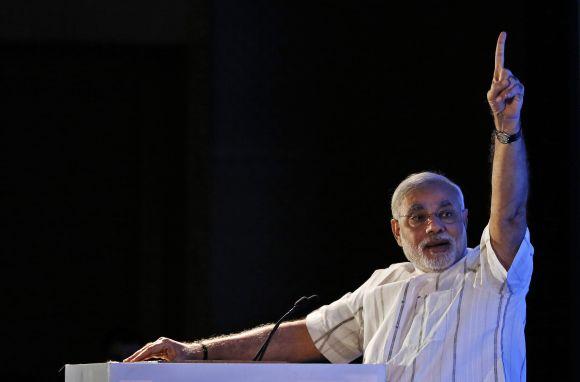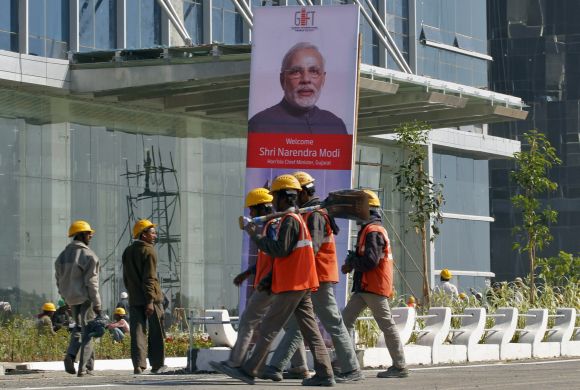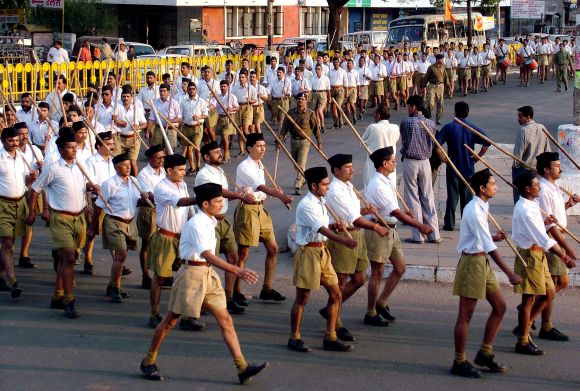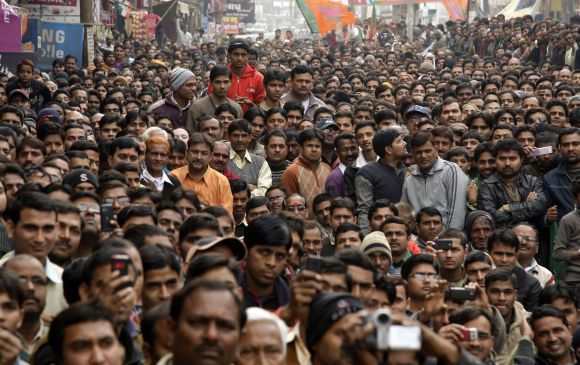
In part 1 of this interview Professor Shiv Visvanathan spoke to Rediff.com's Sheela Bhatt on the recent demonstrations by India's youth, and on current political and social trends.
Part 1: 'Youth were not protesting against rape, but indifference'
In part 2, the intellectual and author talks of the dangers of celebrating the reign of Narendra Modi and why the Gujarat chief minister may be as bad bet as prime minister.
The argument goes that because of incompetence in governance and lack of caring by government in providing basic amenities in most of the parts of India, Narendra Modi kind of leaders are getting acceptance. The hope is that he may provide some basic amenities to the last village. Do you see this kind of connection between the United Progressive Alliance's failure in governance and Modi's increased support base?
There is a connection because if you say the Sonia Gandhi-supported National Rural Employment Guarantee scheme was one form of development, Modi's is a different form of development, more based on corporate development and rapid urbanisation.
See, at one level you can say that Modi is a more efficient administrator, but you have to understand that Modi's administration began with genocide. Also, Modi's urbanisation is basically based on rapid development of the cities.
You have to ask yourself -- who benefits from it? If you look at it, Gujarat has one of the world's greatest population of nomads, pastoral groups, tribals. What will happen to them? But that is a question you will only answer in the future. There is a possibility of the second wave of violence.
In fact, I would say if the murder of Muslims was the first genocide, rapid urbanisation will create the second genocide.
If you see Ahmedabad in the evenings of December, hundreds of people come down. But as the cities develop, it won't be the same. Our cities are also getting security conscious with gated communities and all. So then you don't want these people. You don't want them as full societies living around you because then it becomes a threat.
I think the celebration of Modi is a bit premature. And I think it is a bit silly. But the middle-class loves a man who presents a theory of masculinity, of technocracy and of efficiency. In the long run, I don't think that Modi can deliver.
The corporates and a lot of the media are behind Modi and that gives him a terrific impetus but I think in the long run, Modi is dangerous to India, because he is the kind of model of Chinese authoritarianism presented in Indian dialects. That's the last kind of person we need for a confused and complex democracy such as India.
...

My question was that there is a connection between this state of incompetence and Modi. If we take reality and not just ideal position, then, how do you read the situation?
When I used to teach at DAIICT (Dhirubhai Ambani Institute of Information and Communication Technology) in Ahmedabad, I used to have 240 students. Out of these 230 were in support of Modi.
And they will tell you three things -- sir, he's the only one who can fight Pakistan, he's the only one who can take decisions. You see the Congress regime, keeping Rahul Gandhi waiting like a boy scout for years, has damaged their sense of decisiveness. The third point they made was about development. Modi, to them, is Mr Development, he is also Mr Governance.
So the labels have come and he knows how to play it. Now look at Rahul Gandhi's report card. It is empty. Modi at least has something to show and that is what Nitish Kumar told Rahul Gandhi, you go and become a minister or CM for one year, and then we will take you seriously. And I think it's time UPA takes itself seriously.
Indians who doesn't have political alignment with either the Congress or the BJP, and want governance may look for an alternative in Modi? Isn't it natural?
When the second UPA regime came, it should have had a theory of governance. The first UPA was about liberalisation and reforms. In the second UPA regime one expected major reforms in governance. It didn't happen. Modi hijacked their agenda. He took over the idea of governance first while managing disasters.
The World Bank and such agencies said that his administration of the Bhuj earthquake was first rate. From there he moved to other things. Then the whole automobile scandal, and the way he brought the car and ancillary industry into Gujarat happened. So I think at one level here is a shrewd guy.
He has a group of very good administrators around him, Gujarat has always had, and he exploited it. Let's not be naive about one thing. And the Congress government has been very lazy in thought and in action. And it is pompous. It waits for any kind of decision making by waiting for Sonia Gandhi to react. It humiliates the prime minister, promotes Sonia.
But it doesn't give a clear picture about how the nation thinks. Of how the government thinks? Modi, by taking crude and quick decisions, gives you a sense of being decisive. What is the last decisive thing that the Congress did? A whole generation can't even remember. And also don't forget that the Congress has not been in power in many places for the past 20 years. So people have no memory of the Congress.
Do you think you are fair in judging Modi?
Yes. I think this is a question that lot of people ask me. Why don't you subtract the genocide of Muslims, what other wrong thing has he done? I said it's not as if you can separate what happened in Gujarat in 2002 from the model of development because they are related.
The riot is always the first cleansing of the city. The riot is the first thing that allows a corporation to take over very important pieces of real estate. See what Modi said. He asked the Muslims to come and be consumers. Why don't you be middle-class? So the second wave of development, which people distance it from the first wave (riots and killings) is actually connected.
...

But, technically you are wrong. The riots in 2002 were more in non-urban areas and near Godhra and all....
See there is an interesting thing about the riots. They are usually an urban phenomenon. In Gujarat what was fascinating was the amount of tribals that participated. It takes a social system to do it. Because the Muslims are the new money lenders. The riots and the representation of the riots in public space are two different things. The riot has a spontaneous and a calculated part. The calculated part was the involvement of the regime.
The issue in Gujarat is the way the riot was presented. What was Modi saying? That Muslims are not a part of development, that Muslims are an ethnic group who don't want to join the mainstream and if they don't want to join the mainstream how can I do anything for them? Next step, for those who join the mainstream, I am providing all what I provide to others. So you have to understand that it didn't begin as a full plan, but that this man slowly knit together all these issues.
So you see Modi as a person who entered Gujarat with a plan and ambition.
I'm saying he entered with an ambition and that he also entered with a personality of a pracharak. I am talking of 2001. I remember, one of my friends who was in the Gujarat government, saying that Modi turned Gujarat into society run by pracharaks. He was the chief pracharak so everyone has to follow him. And he found the BJP not influential. So he turned the bureaucrats into pracharaks. That's the only difference.
A person who does not have the basic facilities in life, no clarity about his future and security of his family has the choice between total lack of governance and Modi who is available 24/7. This option between dynastic politics and an autocrat is the only option for people who want basic amenities.
Is it? See I have been the biggest opponent of dynastic politics. I mean I am hardly going to make a claim for Rahul Gandhi. You always talk of the poor people wanting material things. Let me give you counter examples. In the Emergency, it was the poor who voted Indira Gandhi out. And it is the middle-class who didn't.
Also, I have been to many of these famine inquiries and disasters...it's very interesting, it is the poorest who will share. So it is not as if poor Indians are materialist. Poor Indians do have a value frame. Also, yes the Congress has been crass, inefficient, dishonest and arrogant but a critique of the Congress does not become a case for Modi.
It becomes a choice between two kinds of evil. And it shows that India is imaginative enough to think of a third possibility of the future. Nobody wants dynastic politics. So the basic thing is that for a person on the ground who is tired of dynastic politics, tired of Congress corruption, Modi seems like a breath of fresh air. But this breath of fresh air, that you think is a breath of fresh air, is polluted. And I think it will take some time to recognise that.
But if I am poor, why the burden of NOT selecting Modi who may provide water in my tap should be borne by me only?
I agree. If you are saying that Modi is more efficient than the Congress, yes, I agree. I am saying that this efficiency is a short-term efficiency. If you are saying right now that parts of Gujarat in terms of roads and investments are working better, yes. Nobody is denying Modi's achievements.
But, I think it is Modi's achievement and the hoo-ha made around it makes him doubly dangerous. There is one thing that people don't realise is that with Modi there is no feedback of development, there is no critique of his action or style. So if he makes a mistake, it will consolidate itself. So what we are arguing for is not Modi, not Congress, but a different kind of alternate imagination.
...

But I live in reality... I have to select one. What do I do?
But this is precisely what the protest groups have shown. If you look at the Delhi protests, if you look at the Anna Hazare protest, they are saying neither of the two. They tried to play with both, Anna Hazare tried to entertain Modi, he tried to entertain bits of the Congress. What these groups are saying actually is that the political solutions are available to us.
I think that the crisis of Indian politics is deeper. And if you are saying that within that crisis of politics, Modi seems preferable to the Congress, in some ways I understand it. Some people feel that democracy is strong enough so if Modi does something wrong, he can be democratically eliminated.
Also they feel that the overall combination of BJP, RSS will try to control them. Okay, while talking about Modi, let's not deny the plus points of Modi. Let's also not deny the fact that he has done many creative things.
Which chief minister would think of bringing Vishwanathan Anand to Ahmedabad to encourage chess? It's a brilliant move. He is the only chief minister who went to Davos, Switzerland. He's written a book on climate change. So he's showing readiness to learn. I am not denying his shrewdness. I am saying that he is better prepared. More shrewd, better equipped than Rahul Gandhi, Sonia Gandhi or Manmohan Singh.
But the sins of the Congress cannot be equated to the goodness of the BJP. We have to wait. Because remember one thing. The Congress was a very corrupt party for years after independence. So when the BJP came, people thought it would not be equally corrupt, but it is. Corruption is one epidemic that seems to be spreading fast amongst all these parties.
Do you think Modi's biggest plus point is his clean image?
I think the biggest plus point of Modi is the point you raised. That people are tired of the Congress and are ready to give Modi a chance. And it is not a clean image, it's an image which is very distant. He is like a fascist leader who talks directly to the masses. He has eliminated all intermediaries and because of this he looks clean.
He looks clean because the Congress politics is the politics of middle men. So it's two different styles, strategies. The Congress is overtly dirty. Look at the whole medical college scandal in Gujarat. In Modi's case look for the time sequence. And over time Modi will have to rely on putting money into the party coffers because he has spent a lot for his public shows and at that point he will look equally corrupt. He will need to fill in the BJP coffers very soon, then, he will need money.
When we talk about Modi there's a very popular thinking, particularly, amongst the Delhi media. The most common thing said is Gujarat is not India. Meaning that support base that Modi had in Gujarat is because of the way Gujaratis are. Do you think rest of Indian is totally different from Gujaratis?
No. there is resilience about the Gujaratis, especially after the disasters. The way Gujarati society recovered is more because of the society than of the state. The communities came and took care of their peop#8804 the religious people came and took care of their people. Let us give them credit. They pulled off something remarkable.
Also today, Modi's appeal goes far beyond Gujarat. The media used a two-prong strategy. In the beginning they said Modi is good for Gujarat but not for India. But suddenly people have started thinking that maybe Modi is good for India. And I think if anyone has contributed to Modi's success, it is the Congress.
Sometimes I think that, apart from the BJP, RSS, Bajrang Dal etc, the Congress is the fifth wing of the Modi party. They wanted to know whether the Gujarat model could be extended to India as a developmental model depending on rapid urbanisation. There is a lot of appeal for it, even in the Congress. Second they are saying that let's make for public private partnership with a very aggressive state. Why not?
Third they want leadership. So they are saying that these parts of Gujarat appeal to everyone. They don't see it as Gujarat, they see it as exportable Indian. You can see the support to it when you go abroad -- the Diaspora is proud of Modi. They are Indians influencing India. Even professionals and entrepreneurs think Modi is an angel. Let's be clear about it.
That is also a contradiction. On one side he is Mr Clean and the people, the most corrupt force in the country are supporting him.
Even the corrupt are supporting because he's clean and they hope to corrupt him later. That's why I said time sequences are important.
Watch out of the third and final part in which Shiv Visvanathan talks about what will happen if Modi becomes PM.
...